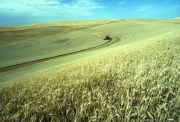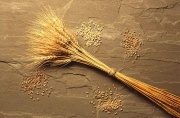Difference between revisions of "Wheat"
Jump to navigation
Jump to search
(username removed) |
(username removed) |
||
| Line 21: | Line 21: | ||
* ''The American Heritage Dictionary'' or ''Encarta'', via Microsoft Bookshelf 98, Microsoft Corp., 1998 | * ''The American Heritage Dictionary'' or ''Encarta'', via Microsoft Bookshelf 98, Microsoft Corp., 1998 | ||
| − | * ''Encyclopedia Britannica'', http://www.britannica.com Comment: "wheat." | + | * ''Encyclopedia Britannica'', http://www.britannica.com Comment: "wheat." Encyclopædia Britannica. 2004. Encyclopædia Britannica Premium Service. 26 Oct. 2004 . |
[[Category:Materials database]] | [[Category:Materials database]] | ||
Revision as of 06:29, 24 July 2013
Description
A cereal grass (genus Triticum) that has been cultivated for food since prehistoric times. Wheat is grown worldwide in temperate regions. The tall stalks (about 1 m) have heads of grain that are primarily ground into flour for pasta, and bread. Wheat grain is also used for making starch, alcohol (beer), and feeding livestock. It contains carbohydrates (70%), and proteins (11-15%) with smaller amounts of minerals and vitamins. The wheat stalks, or straw, are used for fodder, papermaking, and bedding.
Synonyms and Related Terms
wheat straw
Additional Images
Authority
- The American Heritage Dictionary or Encarta, via Microsoft Bookshelf 98, Microsoft Corp., 1998
- Encyclopedia Britannica, http://www.britannica.com Comment: "wheat." Encyclopædia Britannica. 2004. Encyclopædia Britannica Premium Service. 26 Oct. 2004 .



